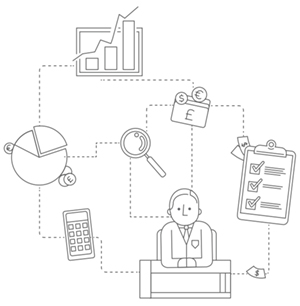Technology has brought many advantages to the way we work – from helping us be more efficient, to providing a suite of new ways to serve customers.
However, every upside must have a downside. For technology, it’s cyberattacks and threats from disgruntled insiders or external hackers who make a living stealing personal data and leveraging it for financial or other benefits. 
With nefarious entities investing millions of dollars in the latest technology, it can be difficult for businesses to keep up. Implementing technical protections and calling it a day simply isn’t enough to keep today’s hackers at bay.
To avoid the financial, reputational and legal repercussions a cyberattack could cause, it’s vital that business owners make security and privacy one of their highest priorities.
Understanding what’s at risk
Businesses have a legal responsibility to protect the privacy of their customers, which includes any data they share, or data the business records about them in order to serve them better.
This means the way you collect customer data, as well as where and how you store it and who can access it, matters from a legal and financial perspective.
Without effective cyber security, malicious insiders and hackers can get access to your system and either misuse or steal customer data. We’ve seen this happen countless times across the past few decades, and no business – whether small or a global corporation – is spared.
For example, hackers recently stole confidential plans from Apple about upcoming products. And earlier this year, an analysis firm reported that 30bn in data records were stolen in 2020, which is more than the previous 15 years combined!
When these organisations are publicly named, the reputational damage can significantly impact people’s perception of and trust in the business, which may also affect future revenue. 
Certain types of cyberattacks have other financial and operational consequences, such as where a hacker places ransomware on a computer or server and demands a large sum before they will release the company’s data. And while the number of companies that agree to pay ransom is relatively small due to the obvious threat of ongoing manipulation, ransom fees are quite often 10 times what you would otherwise have paid to bolster your security and avoid the situation entirely.
Where to start
As a business owner, you may believe hackers would not be interested in your customer data. However, the statistics speak for themselves with 67% of businesses with fewer than 1,000 employees saying they have been subjected to a cyberattack. 64% of companies worldwide say they have experienced at least one cyberattack.
It can be difficult to know where to start when it comes to cyber security. There are multitudes of platforms and solutions out there, but it’s wasted money if you don’t understand what you need to protect and have a plan to mitigate your greatest risks.
At RSM, our cyber security experts are skilled in working with various businesses across all industries to: 
- evaluate their current security posture
- identify gaps and articulate risk exposure
- determine compliance obligations
- develop a targeted cyber security implementation and risk mitigation plan
Our people have decades of experience in cyber security and privacy risk services across an array of industries. We keep up to date on the latest threats so we can pass this knowledge on to our clients and help them keep their data, business and customers safe.
For more information or to discuss security and privacy within your business, contact your local RSM office today.
Businesses have a legal responsibility to protect the privacy of their customers. Effective cyber security can stop hackers from accessing your system and stealing customer data. Click here to learn more.

